Related Research Articles
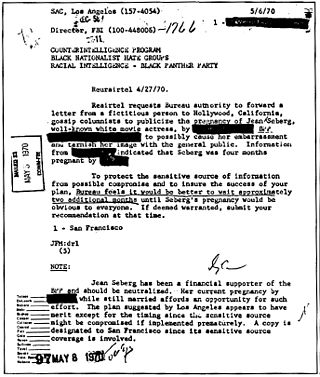
COINTELPRO was a series of covert and illegal projects actively conducted by the United States Federal Bureau of Investigation (FBI) aimed at surveilling, infiltrating, discrediting, and disrupting domestic American political organizations. FBI records show COINTELPRO resources targeted groups and individuals the FBI deemed subversive, including feminist organizations, the Communist Party USA, anti–Vietnam War organizers, activists of the civil rights and Black power movements, environmentalist and animal rights organizations, the American Indian Movement (AIM), Chicano and Mexican-American groups like the Brown Berets and the United Farm Workers, independence movements, a variety of organizations that were part of the broader New Left, and white supremacist groups such as the Ku Klux Klan and the far-right group National States' Rights Party.
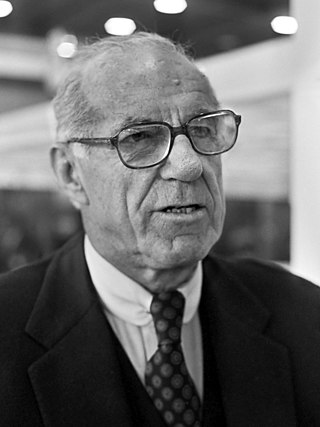
Benjamin McLane Spock was an American pediatrician and left-wing political activist whose book Baby and Child Care (1946) is one of the best-selling books of the twentieth century, selling 500,000 copies in the six months after its initial publication in 1946 and 50 million by the time of Spock's death in 1998. The book's premise told mothers, "You know more than you think you do." Spock's parenting advice and recommendations revolutionized parental upbringing in the United States, and he is considered to be among the most famous and influential Americans of the 20th century.
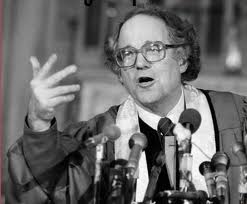
William Sloane Coffin Jr. was an American Christian clergyman and long-time peace activist. He was ordained in the Presbyterian Church, and later received ministerial standing in the United Church of Christ. In his younger days he was an athlete, a talented pianist, a CIA officer, and later chaplain of Yale University, where the influence of H. Richard Niebuhr's social philosophy led him to become a leader in the civil rights movement and peace movements of the 1960s and 1970s. He also was a member of the secret society Skull and Bones. He went on to serve as senior minister at Riverside Church in New York City and President of SANE/Freeze, the nation's largest peace and social justice group, and prominently opposed United States military interventions in conflicts, from the Vietnam War to the Iraq War. He was also an ardent supporter of gay rights.

The Institute for Policy Studies (IPS) is an American progressive think tank started in 1963 that is based in Washington, D.C. It was directed by John Cavanagh from 1998 to 2021. In 2021 Tope Folarin was announced as new Executive Director. It focuses on U.S. foreign policy, domestic policy, human rights, international economics, and national security.
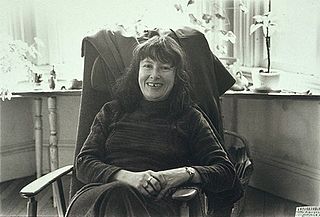
Priscilla Denise Levertov was a British-born naturalised American poet. She was a recipient of the Lannan Literary Award for Poetry.
South End Press was a non-profit book publisher run on a model of participatory economics. It was founded in 1977 by Michael Albert, Lydia Sargent, Juliet Schor, among others, in Boston's South End. It published books written by political activists, notably Arundhati Roy, Noam Chomsky, bell hooks, Winona LaDuke, Manning Marable, Ward Churchill, Cherríe Moraga, Andrea Smith, Howard Zinn, Jeremy Brecher and Scott Tucker. South End Press closed in 2014.
Dwight Macdonald was an American writer, critic, philosopher, and activist. Macdonald was a member of the New York Intellectuals and editor of their leftist magazine Partisan Review for six years. He also contributed to other New York publications including Time, The New Yorker, The New York Review of Books, and Politics, a journal which he founded in 1944.
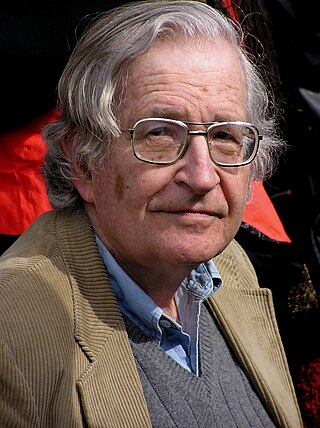
Noam Chomsky is an intellectual, political activist, and critic of the foreign policy of the United States and other governments. Noam Chomsky describes himself as an anarcho-syndicalist and libertarian socialist, and is considered to be a key intellectual figure within the left wing of politics of the United States.

The Citizens' Commission to Investigate the FBI was an activist group operational in the US during the early 1970s. Their only known action was breaking into a two-man Media, Pennsylvania, office of the Federal Bureau of Investigation (FBI) and stealing over 1,000 classified documents. They then mailed these documents anonymously to several US newspapers to expose numerous illegal FBI operations which were infringing on the First Amendment rights of American civilians. Most news outlets initially refused to publish the information, saying it related to ongoing operations and that disclosure might have threatened the lives of agents or informants. However, The Washington Post, after affirming the veracity of the files which the Commission sent them, ran a front-page story on March 24, 1971, at which point other media organizations followed suit.
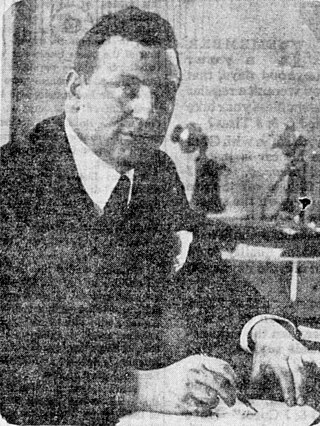
Francis Joseph William Ford was a United States district judge of the United States District Court for the District of Massachusetts.
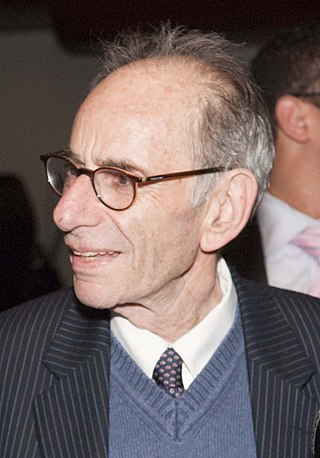
Marcus Goodman Raskin was an American progressive social critic, political activist, author, and philosopher. He was the co-founder, with Richard Barnet, of the progressive think tank the Institute for Policy Studies in Washington, DC. He was also a professor of public policy at The George Washington University’s School of Public Policy and Public Administration.
Holder v. Humanitarian Law Project, 561 U.S. 1 (2010), was a case decided in June 2010 by the Supreme Court of the United States regarding the Patriot Act's prohibition on providing material support to foreign terrorist organizations. The case, petitioned by United States Attorney General Eric Holder, represents one of only two times in First Amendment jurisprudence that a restriction on political speech has overcome strict scrutiny. The other is Williams-Yulee v. Florida Bar.
Mitchell Goodman was an American writer, teacher, and activist. He is best known for his role in the Vietnam draft resistance movement, which drew the high-profile 1968 federal prosecution of the "Boston Five."
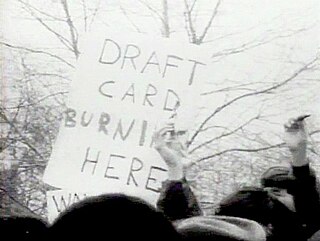
Draft-card burning was a symbol of protest performed by thousands of young men in the United States and Australia in the 1960s and early 1970s. The first draft-card burners were American men participating in the opposition to United States involvement in the Vietnam War. The first well-publicized protest was in December 1963, with a 22-year-old conscientious objector, Gene Keyes, setting fire to his card on Christmas Day in Champaign, Illinois. In May 1964, a larger demonstration, with about 50 people in Union Square, New York, was organized by the War Resisters League chaired by David McReynolds.

Gary Eugene Rader was an American Army Reservist known for burning his draft card in protest of the Vietnam War, while wearing his U.S. Army Special Forces uniform. Afterward, he engaged in anti-war activism.

Antimilitarism is a doctrine that opposes war, relying heavily on a critical theory of imperialism and was an explicit goal of the First and Second International. Whereas pacifism is the doctrine that disputes should be settled without recourse to violence, Paul B. Miller defines anti-militarism as "ideology and activities...aimed at reducing the civil power of the military and ultimately, preventing international war". Cynthia Cockburn defines an anti-militarist movement as one opposed to "military rule, high military expenditure or the imposition of foreign bases in their country". Martin Ceadel points out that anti-militarism is sometimes equated with pacificism—general opposition to war or violence, except in cases where force is deemed necessary to advance the cause of peace.

1971 is a 2014 American documentary film and the directorial debut of producer Johanna Hamilton, who also co-wrote the film. The film had its world premiere on 18 April 2014 at the Tribeca Film Festival and focuses on the break-in of an FBI office in Media, Pennsylvania on Monday, March 8, 1971, to steal over 1000 classified documents. It was pitched at the Sheffield Doc/Fest 2011 MeetMarket preceding its debut. The break-in took place on the night of the first Ali-Frazier boxing title fight dubbed the Fight of the Century.
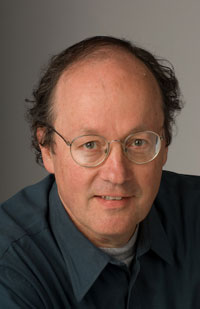
Michael Kelvin Ferber was the youngest of the five defendants in the federal anti-draft trial in the spring of 1968 in Boston, Massachusetts. The trial attracted national attention because one of the defendants was Dr. Benjamin Spock, the well-known pediatrician and author of the best-selling The Common Sense Book of Baby and Child Care. The other defendants were the Rev. William Sloane Coffin, Jr., chaplain of Yale University; Mitchell Goodman, novelist and teacher; and Marcus Raskin, a lawyer who served briefly on the U.S. National Security Council under Kennedy and co-founded the Institute for Policy Studies. The trial was known as "The Spock Trial" and the defendants as "The Boston Five".
Allan Robert Rosenberg was a 20th-century American labor lawyer and civil servant, accused as a Soviet spy by Elizabeth Bentley and listed under Party name "Roy, code names "Roza" in the VENONA Papers and code name "Sid" in the Vasilliev Papers; he also defended Dr. Benjamin Spock.
Putnam, Bell & Russell is a law office in Marblehead, Massachusetts, which was "one of the first law offices in Boston" and once represented the American Telephone and Telegraph Company when its headquarters were on Boston.
References
- ↑ "About." RESIST. RESIST, Inc., n.d. Web. 4 Jun 2014. <http://resistinc.org/about>.
- 1 2 3 4 Barsky, Robert F. Noam Chomsky: a life of dissent. 1st ed. Cambridge: M.I.T. Press, 1998. Web. < "Chapter 4: The Intellectual, the University, and the State". Archived from the original on 2013-01-16. Retrieved 2014-06-24.>.
- ↑ Goodman, Mitchell. "An Exchange on Resistance." New York Review of Books. 10 Apr 1969: n. page. Print. <http://www.nybooks.com/articles/archives/1969/apr/10/an-exchange-on-resistance/>.
- ↑ "A Call to Resist Illegitimate Authority." Michigan State University. N.p., 12 Oct 1967. Web. 4 Jun 2014. <http://coursesa.matrix.msu.edu/~hst306/documents/resist.html>.
- ↑ Jessica Mitford. 1969. The Trial of Dr. Spock, the Rev. William Sloane Coffin, Jr., Michael Ferber, Mitchell Goodman, and Marcus Raskin. [1st ed.]. New York, Knopf.255.
- 1 2 3 4 Kutik, William M,. "Boston Grand Jury Indicts Five For Working Against Draft Law." Harvard Crimson. 08 Jan 1968: n. page. Web. 4 Jun. 2014. <http://www.thecrimson.com/article/1968/1/8/boston-grand-jury-indicts-five-for/>.
- 1 2 3 Ryan, Michael. "Phone Co. Gives Names to FBI." Harvard Crimson. 12 May 1971: n. page. Web. 4 Jun. 2014. <http://www.thecrimson.com/article/1971/5/12/phone-co-gives-names-to-fbi/>.
- 1 2 Brancaccio, David. "COINTELPRO Again?." PBS. Public Affairs Television, 05 Mar 2005. Web. 4 Jun 2014. <https://www.pbs.org/now/politics/cointelpro.html>.
- 1 2 Rahman, Saif. "Resisting Complexes since 1967." RESIST. 24.2 (2015): p.3. Print. 24 Jun. 2015. <Resist. The Newsletter: Resist's Annual Report. Spring 2015>.